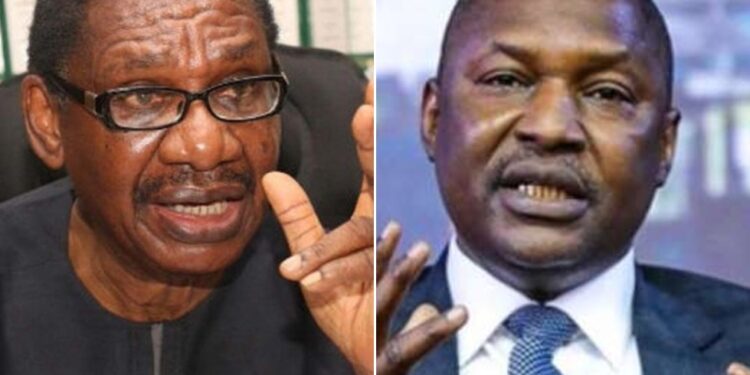Abubakar Malami, the Attorney-General of the Federation and Minister of Justice, has recommended the disbandment of the Presidential Advisory Committee Against Corruption (PACAC) headed by Prof. Itse Sagay to President Muhammadu Buhari, Daily Independent has gathered.
Sources said Malami’s argument was that the committee has outlived its usefulness and should be disbanded like the Special Presidential Investigation Panel for the Recovery of Public Property (SPIP) formerly under the supervision of Okoi Obono-Obla.
President Buhari disbanded the SPIP in September 2019 and transferred the duties of the panel to Malami.

PACAC was established in August 2015, with the mandate to promote the reform agenda of the government on the anti-corruption effort, and to advise the present administration in the prosecution of the war against corruption and the implementation of required reforms in Nigeria’s criminal justice system.
Daily Independent gathered that trouble began between Malami and PACAC over the committee members’ belief that the minister was interfering in some of their works, especially on their report on some corrupt Nigerians.
The committee also incurred Malami’s wrath when it declared public support for the reappointment of Ibrahim Magu, former acting chairman of the Economic and Financial Crimes Commission (EFCC).
However, Malami, in a memo to President Buhari, accused Magu of a myriad of contraventions, especially “diversion of recovered loot, insubordination and misconduct”. He further said that Magu was not transparent enough in the management of the recovered assets.
Magu was later probed and found guilty of the charges leveled against him by the Justice Ayo Salami panel which recommended his sack.
The president, thereafter, appointed Abdulrasheed Bawa, the Lagos zonal head of EFCC, as the substantive chairman of the anti-graft agency.
Following Bawa’s confirmation by the Senate, Sagay had said Malami, as the person who recommended him for the position, will interfere in his work and will not allow him to operate.
Responding, the minister through his spokesperson, Dr. Umar Jibrilu Gwandu, said Sagay is “a confused old man whose vision is beclouded by speculations and guess works.”
Speaking with Daily Independent on Sunday, a presidency source said Malami has called for the disbandment of PACAC as the committee is no longer relevant to the anti-corruption war.
“The minister has made some recommendations, one of which is the disbandment of PACAC. It, however, remains to be seen whether the president will approve of it or not”.
When contacted, Malami, who spoke through his media aide, said only the presidency that established PACAC can determine whether it is still useful or not.
“PACAC is a presidential committee established by the presidency long before the appointment of Abubakar Malami, SAN, as the Attorney General of the Federation and Minister of Justice and his assumption into office in 2015.
“The fate of the existence or otherwise of the committee is exclusive preserve of the presidency regardless of whether it outlives its usefulness or not.”
Also speaking, Prof. Sagay said contrary to what the minister or others may think, PACAC is still very relevant in the fight against corruption in the country.
Listing some of the achievements of the committee since its formation, Sagay said, “All I will say is that whatever he may think, the committee is still very relevant to the fight against corruption in this country.
“We provide the coordination of the two agencies (EFCC and ICPC), we train and help to mobilise and encourage the anti-corruption agencies to be more effective. We have a lot of ideas that we have been pumping into the system which they are using.
“We have written books on prosecution, sentencing and various other issues which are relevant to their work, apart from actually training them. This is a continuous process.
“This issue of recoveries, which is a major part of the work of the two agencies is hugely a result of the various trainings that we gave to the agencies in 2017 on recovery of assets when we found that sentencing the victims in politics was difficult.
“We thought let us recover what they looted and we invited experts from all over the world in that field to provide trainings, including United Nations personnel. So, we are still very vital to the fight against corruption in this country”.









